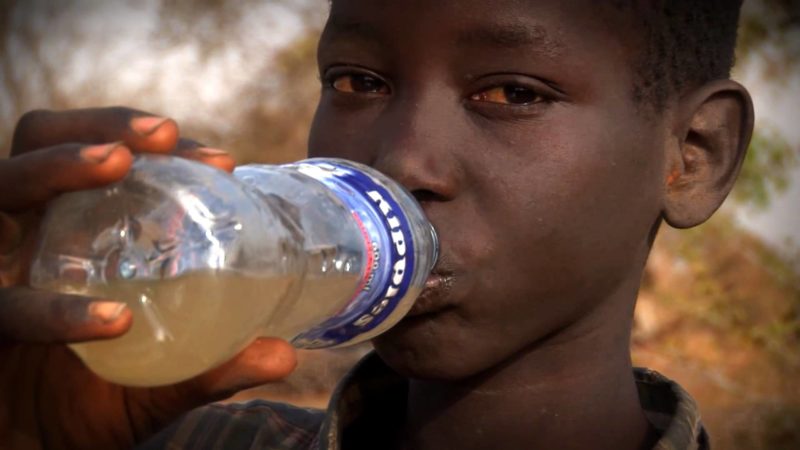A decade-old campaign by German environment activist group, Sign of Hope, to stop the destruction of lives, livelihoods and the environment in South Sudan as a result of large scale oil pollution may have accomplished a major breakthrough.

In a hearing held on Wednesday, April 4, 2018 the country’s Legislative Assembly began to take a searching look at the causes and effects of the devastation, which has been repeatedly described by authoritative sources as being “one of the world’s great crimes against the environment and humanity.”
The hearing follows years of denials by the country’s government that the problem even existed. The denial was reportedly accompanied by the persecution of journalists who had uncovered the scandal.
The hearing features testimony by Dr. Bior K. Bior, the expert and somewhat fearless investigator of Big Oil’s practices, and by the country’s ministers of petroleum, the environment and others.
These testimonies, in turn, build on the systematic field work conducted by Sign of Hope and its team of scientists.
Sign of Hope says that, since 2008, it has waged “a heroic campaign” to put an end to “one of the world’s most horrifying environmental scandals”, which it describes as the pollution of water and land in South Sudan by China National Petroleum, Malaysia’s Petronas, India’ ONGC Videsh and other oil giants.
The group describes “the scandal” as the pouring of heavy metals and salts-laden wastes into South Sudan’s ground water. The consequences of the dissemination of this “witches brew”, it adds, are that millions of lives, livelihoods and square kilometres of the environment have been devastated, and some completely destroyed.
“This long and hard campaign has recently achieved a number of heartening and striking breakthroughs. Along with new and important information, these breakthroughs – and what they mean for the hard-pressed South Sudanese – will be presented at a press conference on Wednesday, April 18, 2018 in Berlin, Germany,” disclosed the group.
The forum, it was gathered, will feature input from Nnimmo Bassey, whose title of “Hero of the Environment” and receipt of the Alternative Nobel Prize stemmed from his leading the fight against Big Oil’s contamination of Nigeria’s Niger Delta; and from Bior K. Bior, who has repeatedly risked his life to investigate and chronicle abuses of power by South Sudan’s corrupt government and its corrupt allies.
Oil was discovered in what would become South Sudan in 1979. Production commenced in 1993. From the very outset there were concerns about the oil companies’ adherence to the environmental standards imposed on the disposal of the processed water ensuing from their pumping operations. Indigenous people consuming water taken from wells located in the catchment areas of the oil rigs began arriving at local clinics.
The peoples’ health complaints ranged from nausea and skin problems to neurological disorders. The villagers also reported that the water in their wells had become salty, that it stank, and that their livestock and plants were ailing, even dying after having consumed it.
In the early 2000s, local residents resisted their forced expulsion from their lands by oil companies and their governmental allies. South Sudan was recently ranked as the most dangerous country in the world for humanitarian workers – due to the world’s highest rate of fatalities and other grave incidents. This comes with the assassination of a number of journalists who were striving to report on the links between Big Oil and the South Sudanese government.
In 2008, Sign of Hope, a German NGO that supports two clinics in South Sudan, decided to launch an investigation. Conducted by Sign of Hope and associated scientists, this investigation comprised the making of field trips entailing the taking of samples of water in local wells and in catchment pits situated in the Thar Jath oil field. The samples of water and hair were then evaluated by laboratories of unimpeachable reputation.
The findings: the water was contaminated with a witches’ brew of heavy metals, salts and other noxious substances. The source of these was quite obviously the local oil field. Sign of Hope also delivered the ‘smoking gun’ proving the link between the desecration of the groundwater in and around the oil fields and the destruction of lives and habitats. This “smoking gun” took the form of samples of local residents’ hair, which international experts found to contain shockingly high concentrations of noxious chemicals. All told, some 180,000 local peoples have been exposed to the effects of this contamination.
Since Thar Jath is only one of the 10 oil fields in South Sudan, and since long-term and latitudinal effects have yet to be covered, the actual number of victims could well be in the millions. Perpetrators of the contamination are said to include notably China National Petroleum Corporation, Indian company Videsh and Malaysia’s Petronas.
Sign of Hope has been spearheading a campaign to convince the oil companies and their governmental and corporate allies to desist such practices, to remediate the environment, and to treat local residents’ ailments – and to provide them with compensation for their loss of life and livelihood. Affected by this contamination are the Sudd wetlands (one of the world’s greatest sources of biodiversity) and the Nile, which creates and drains them. Needed is a full-scale, country-wide investigation, especially in view of South Sudan’s plans to greatly ramp up the pumping of oil.
Forms of mobilisation: local residents have organised themselves into self-help groups that strive to make their communities aware – via talks, street theatre and works of art – of the dangers of consuming poisoned water. As has been the case with efforts to find alternative sources of water, this self-help has been hampered by the hunger and fear plaguing most of South Sudan. They have caused millions of South Sudanese to flee.
